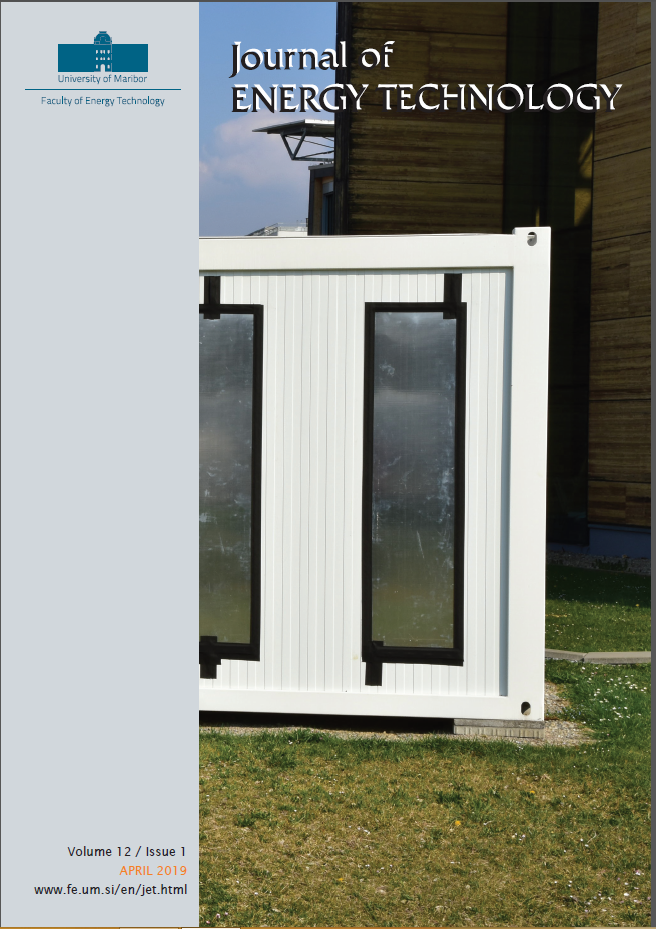ENERGY INDICATORS AND TOPICS IN FOOD SUPPLY CHAINS’ LIFE CYCLE ASSESSMENT
DOI:
https://doi.org/10.18690/jet.12.1.55-67.2019Keywords:
energy, food supply chain, life cycle assessment, LeximancerAbstract
Food supply chains have a significant impact on the environment, using large amounts of fossil energy resources and other non-renewable resources. Energy is directly and indirectly needed in all the steps
along the food supply chain. This paper explores energy-related indicators in food supply chains and life cycle assessment within sixty-six research papers, gathered from the Web of Science database. Furthermore, a quantitative content analysis was carried out to assess the research trends and future opportunities regarding energy-related topics. The results revealed that a holistic perspective is needed, as energy-related indicators should be included in the use and end-of-life stages, not only in the production processes, and that the inclusion should follow the life cycle assessment methodology. The current research topics are energy issues related to production processes and environmental impacts. Improvements are possible in extending research areas to renewable resources, whole lifecycle perspectives, and socio-economic consequences
Downloads
References
M.V. Markussen, M. Kulak, L.G. Smith, T. Nemecek, H. Østergård: Evaluating the sustainability of a small‐scale low‐input organic vegetable supply system in the United Kingdom, Sustainability, Vol. 6, Iss. 4, p.p. 1913‐1945, 2014
Food and Agricultural Organization of the United Nations (FAO): Energy‐Smart Food at FAO: An overview. Chapter 1: At a glance: a role of energy in food security and climate, 2015. Available online: http://www.fao.org/3/an913e/an913e01.pdf (accessed: 10 April2019).
J. Bengtsson, J. Seddon: Cradle to retailer or quick service restaurant gate life cycleassessment of chicken products in Australia, Journal of Cleaner Production, Vol. 41, p.p. 291‐300, 2013
L.I. Noya, V. Vasilaki, V. Stojceska, S. González‐García, C. Kleynhans, S. Tassou, E. Katsou: An environmental evaluation of food supply chain using life cycle assessment: A case study on gluten free biscuit products, Journal of Cleaner Production, Vol. 170, p.p 451‐461, 2018
W.L. Biswas, G. Naude: A life cycle assessment of processed meat products supplied to Barrow Island: a Western Australian case study. Journal of Food Engineering, Vol. 180, p.p. 48‐59, 2016
N. M Holden, E. P. White, M. C. Lange, T. L. Oldfield: Review of the sustainability of food systems and transition using the Internet of Food, npj Science of Food, Vol. 2, Iss. 1, p.p. 18, 2018
S. Keyes,P. Tyedmers, K. Beazley: Evaluating the environmental impacts of conventional and organic apple production in Nova Scotia, Canada, through life cycle assessment, Journal of Cleaner Production, Vol. 104, p.p 40‐51, 2015
L. Mogensen, J.E. Hermansen, N. Halberg, R. Dalgaard: Life Cycle Assessment across food supply chain, Sustainability in Food Industry. Chapter 5 p.p. 115–144. 2009.
International Organization for Standardization: ISO, Environmental Management – life cycle assessment – principles and framework, ISO 14040, Geneva, 2006 International Organization for Standardization: ISO, Environmental Management – life cycle assessment – principles and framework, ISO 14044, Geneva, 2006
G. A McAuliffe, T. Takahashi, M. R. Lee: Framework for life cycle assessment of livestock production systems to account for the nutritional quality of final products, Food and energy security, Vol. 7, Iss. 3, e00143, 2018
R. Arvidsson, M. Svanström: A Framework for Energy Use Indicators and Their Reporting in Life Cycle Assessment. Integrated Environmental Assessment and Management, Vol. 12, Iss. 3, p.p. 429–436, 2015.
D. Angus, S. Rintel, J. Wiles: Making sense of big text: a visual‐first approach for analysing text data using Leximancer and Discursis. International Journal of Social Research Methodology, Vol. 16, Iss. 30 p.p. 261‐267, 2013
B. Hyndman, S. Pill: What’s in a concept? A Leximancer text mining analysis of physical literacy across the international literature. European Physical Education Review, Vol. 24, Iss. 3, p.p. 292‐313, 2018
C. Biesenthal, R. Wilden: Multi‐level project governance: Trends and opportunities. International Journal of Project Management, Vol. 32 Iss. 8, p.p. 1291‐1308, 2014
C. Campbell, L. F. Pitt, M. Parent, P. R. Berthon: Understanding consumer conversations around ads in a Web 2.0 world. Journal of Advertising, Vol. 40, Iss. 1, p.p. 87‐102, 2011
R. B. Baldauf, R. B. Kaplan: Australian applied linguistics in relation to international trends. Australian Review of Applied Linguistics, Vol. 33, Iss. 1, p.p 4‐1, 2010
S. Jez, D. Spinelli, A. Fierro, A. Dibenedetto, M. Aresta, E. Busi, R. Basosi: Comparative life cycle assessment study on environmental impact of oil production from micro‐algae and terrestrial oilseed crops. Bioresource technology, Vol. 239, p.p. 266‐275, 2017
P. Fréon, H., Durand, A. Avadí, S. Huaranca, R. O. Moreyra: Life cycle assessment of three Peruvian fishmeal plants: Toward a cleaner production. Journal of cleaner production, Vol. 145, p.p. 50‐63, 2017
J. H. Miah, A. Griffiths, R. McNeill, S. Halvorson, U. Schenker, N. D. Espinoza‐Orias, J. Sadhukhan: Environmental management of confectionery products: Life cycle impacts and improvement strategies. Journal of cleaner production, Vol. 177, p.p. 732‐751, 2018
R. Turconi: Life cycle assessment of electricity systems. Kgs. Lyngby: DTU Environment. 2014. Available online:http://orbit.dtu.dk/files/89362197/Roberto_Turconi_PhD_Thesis_WWW_Version.pdf (accessed 10th April 2019). M.A. Huijbregts, L. J.A. Rombouts, S. Hellweg, R. Frischknecht, J. A. Hendriks, D. van de Meent, A. M.J. Ragas, L. Reijnders, J. Struijs: Is Cumulative Fossil Energy Demand a Useful Indicator for Environmental Performance of Products. Environ. Sci. Technol. Vol. 40, Iss. 3, p.p. 641–648, 2006.
European Commission. PEFCR Guidance document, ‐ Guidance for the 14 development of Product Environmental Footprint Category Rules (PEFCRs), version 6.3, May 2018.
